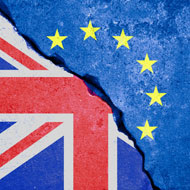Brexit briefing highlights vital role of vets

"We can only make a success of Brexit if we harness our veterinary resource” - Gudrun Ravetz, BVA President.
Leading vets, MPs and peers assembled at the House of Commons last Tuesday (27 June) to discuss animal health and welfare, public health and veterinary workforce issues in a Brexit briefing by the BVA and the RCVS.
Held less than three weeks after the General Election, the briefing highlighted to members of both Houses the vital role the veterinary profession plays to ensure that the veterinary resource is appropriately considered during Brexit negotiations.
The event was joined by Lord Gardiner of Kimble - Parliamentary Under Secretary of State for the Department for Environment, Food and Rural Affairs (Defra) - and MPs from the Scottish National Party, Plaid Cymru, the Conservatives, Labour and Liberal Democrats.
BVA president Gudrun Ravetz delivered a speech highlighting key asks from BVA’s ‘Brexit and the veterinary profession’ report which was developed through extensive consultation with BVA members, devolved branches, BVA specialist divisions and other key stakeholders.
“We are a relatively small profession, but we are a diverse profession with far-reaching influence and impact in so many areas of political and public life,” she said.
“Last week, we were delighted to hear the Defra Secretary of State, speaking to the Today programme, rightly acknowledge the importance of EU vets to the UK economy; from food hygiene and safety to monitoring disease outbreaks and facilitating trade. This is why BVA is calling on the Government to guarantee the working rights for non-UK EU vets and vet nurses currently working and studying in the UK at the existing level and with no time limit.”
She added: “As we progress with the Repeal Bill we are also calling on the Government to ensure we maintain animal health and welfare current standards – and prioritise them in all trade negotiations, so that high standards of animal health, welfare and food hygiene are a unique selling point for the UK. We can only make a success of Brexit if we harness our veterinary resource.”
In his speech, RCVS junior vice-president Professor Stephen May highlighted the three RCVS Brexit Principles as well as the findings from the College’s recent survey of non-UK EU vets working in the United Kingdom.
He also called for greater certainty from the Government on the status of EU citizens living and working as veterinary surgeons in the UK and for a substantial transition period to prevent potential veterinary workforce shortages - particularly in areas such as public health and food safety.
“Negotiations with our European partners will no doubt be lengthy and complex on all manner of issues that affect the veterinary sector,” he said. “For everyone concerned, we join other voices in calling for a substantial transition period to any new order created.”



 The Veterinary Medicines Directorate (VMD) is inviting applications from veterinary students to attend a one-week extramural studies (EMS) placement in July 2026.
The Veterinary Medicines Directorate (VMD) is inviting applications from veterinary students to attend a one-week extramural studies (EMS) placement in July 2026.